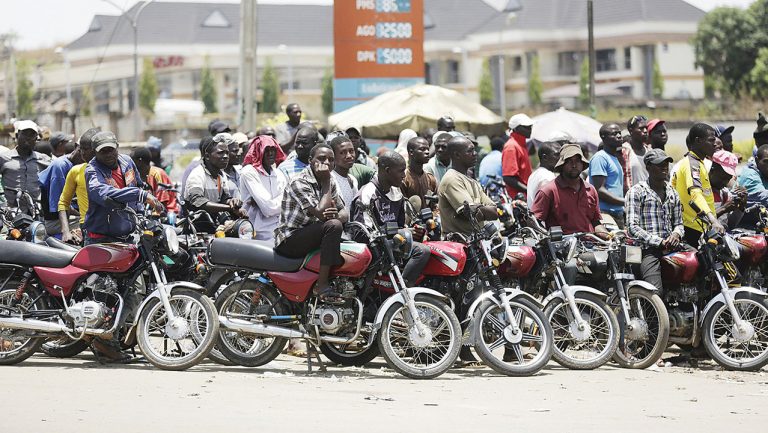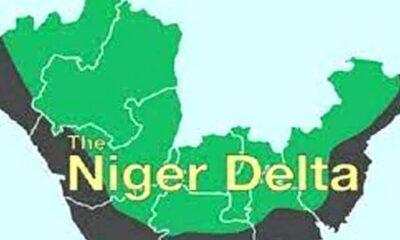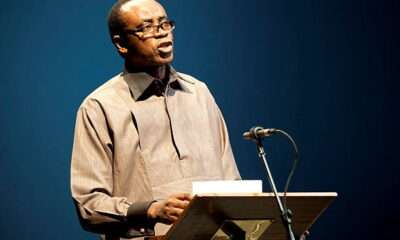News
OPINION: GMOs, Biosafety And Human Rights
Published
1 month agoon
By
Editor
By Nnimmo Bassey
Nigeria, like many other African nations, stands at a crossroads to her food future. The stark choice is between adopting agricultural biotechnology in line with the industrial agriculture model or agreocology (regenerative agriculture). The former, in the guise of enhancing agricultural productivity, and fostering economic development, locks in monocultures, loss of biodiversity, seed monopoly and seed/food colonialism, while the latter delivers increased productivity and economic resilience and also nourishes and revives ecosystems, strengthens local economies, mitigates climate/environmental crises and promotes food sovereignty.
In this workshop, we will examine the very pressing and complex issues of genetically modified organisms (GMOs) and biosafety. As judiciary officials in various capacities, entrusted with upholding the rule of law and ensuring justice prevails in our society, it is imperative that we are well-versed in the intricacies of this rapidly evolving field and risky technology.
GMOs ride on the wave of global fetishization of technology by which technology is considered a silver bullet. Besides posing difficulties to regulatory frameworks, they directly impact on human as well as socio-economic rights of our peoples. The complex threats and attendant risks of this technology makes it expedient that we examine the implications of GMOs through the lens of fundamental human rights. It is important to understand that GMOs represent a paradigm shift in agriculture. These are plants, animals, or microorganisms that have undergone fundamental changes at the cellular level and can no longer be considered natural. Most of them are engineered to withstand dangerous herbicides which kill other species except the engineered ones. Other crops are genetically engineered to act as pesticides ostensibly to kill identified pests that would otherwise attack the crop or seeds. Examples include Bt Cotton and Bt Cowpea or beans approved for commercial release in Nigeria. The implication of eating a seed engineered to kill a pest is that you are actually eating a pesticide with unexamined implications including on the microbes in our guts.
READ ALSO: Environmental Activist, Nnimmo Bassey, Harps On Benefits Of Renewable Energy
GMOs are promoted in Nigeria on the premise of addressing food insecurity. However, after almost three decades since their introduction in the world, they have not eradicated or reduced hunger. Rather, they lock in the system that promotes hunger by degrading soils, reducing biodiversity, disregarding the knowledge of local food producers, and concentrating power in the hands of a few market players.
The hope of Nigeria dominating the international market and generating billions of US dollars is a pipe dream as nations who do not endorse genetically modified crops will not accept our products unless we wish to further make capital on the opacity in the handling and trading of these and other seeds.
The truth, distinguished participants, is that we don’t need GMOs to feed our population. This technology threatens the lives and rights of our local farmers who have selected and preserved seeds, crops, and animal varieties over the centuries. Our farmers have kept the stock of varieties that both provide food and meet our medicinal, cultural and other needs.
In a country like Nigeria, consumers are unable to exercise the right to chose whether or not to consume GMOs due to the peculiar way food is sold and consumed. We cannot label the foods and seeds largely sold on the roadside, in the traffic, and in an assortment of our informal markets. This is if labelling were to even be successfully enforced.
What is needed to enhance food production in Nigeria is the provision of supports to our family farmers and the adoption of farming methods that enhance the health of our soils. Healthy soils build ecosystem resilience to environmental stressors and build biodiversity instead of encouraging monocultures which are vulnerable to pests. We need a system that supports farmers with needed access to credits, land, infrastructure and access to markets. We have a moral obligation to steward the Earth’s resources responsibly and to preserve the integrity of our ecosystems for present and future generations. These and more are what agroecology does.
READ ALSO: COP28 And The Quest For Climate Justice
As guardians of the law, it is pertinent to ensure that the Precautionary Principle is strictly applied when anyone wishes to introduce any genetically modified organism into Nigeria. The fact that there is a requirement for risk assessment during the application stage affirms that this is a risky technology. It should be considered unconscionable that public opinion is ignored or that promoters of the technology are also saddled with regulating same, or vice versa.
The introduction, cultivation, and trade of GMOs at a minimum should adhere to robust regulatory frameworks that prioritize biosafety and safeguard the public interest. Nigeria, like many countries, has enacted legislation and established regulatory bodies to oversee the assessment, approval, and monitoring of GMOs. The National Biosafety Management Agency Act 2015 (as amended) is however froth with loopholes that prevent the legislation from adequately safeguarding the health and interest of the Nigerian people. Not withstanding, GMOs are approved for use in Nigeria in a way that does not conform to the provisions of the Act or global best standards.
It is incumbent upon us to interpret and apply the provisions of the law judiciously, balancing the interests of innovation, agricultural sustain-ability, and public welfare. We cannot afford to turn our people into guinea pigs or allow promoters of the technology to deceive our farmers into believing they are given improved seeds when in fact they are trapped into planting seeds of dubious safety claims.
Furthermore, we emphasize the importance of transparency, public participation, and informed decision-making in matters concerning GMOs. The processes of approvals of GMOs so far do not recognise these elements as the responsible agency – the National Biosafety Management Agency has gone ahead to approve GMOs despite objections based on scientific, and ethical concerns.
Judges play a crucial role in adjudicating disputes, ensuring due process, and upholding the rights of all stakeholders, including farmers, consumers, and environmental advocates. Adjudicators should resist pressures and influence of vested interests and ensure that decisions regarding GMOs are guided by the precautionary approach, ethical principles and scientific evidence. While technological advancements hold out promises, we must not compromise the safety of our people or the integrity of our ecosystems.
In conclusion, we note that it is imperative to approach the issue of GMOs and biosafety with the utmost diligence, impartiality, and commitment to upholding the principles of justice. It is our hope that this training will deepen our understanding, encourage meaningful dialogue, and resolve to promote the common good and our collective right to food justice..
Nnimmo Bassey is an environmental activist and Executive Director, Health of Mother Earth Foundation (HOMEF).
You may like


Pollution: Activists Want N’Delta Environmental Remediation Trust Fund Established


Oil Spill: Pay A Visit To Impacted N’Delta Communities, Environmental Activists Urge Tinubu


World Earth Day: Environmentalist Advocates End to Plastic Wastes to Save Mother Earth


World Water Day: Privatization Of Water Antithetical To Principles Of Commons – Bassey


Land Grabbing, Extractivism, And Climate Change [The Impacts On Communities]


NABDA, NACGRAB Merger Dangerous For Nigeria’s Biosafety, HOMEF Warns
News
Lagos, Ondo, Taraba Top In Highest Okada Fares In March – NBS
Published
1 hour agoon
April 28, 2024By
Editor
A recent National Bureau of Statistics report shows Lagos, Ondo, and Taraba recorded the highest Okada (motorcycle) fares in March.
The data indicates substantial differences in transportation costs across various Nigerian states.
In March 2024, the average fare for Okada rides per trip in Nigeria rose by 2.15% compared to the same period last year, with fares reaching N472.16, up from N462.21 in March 2023.
This was contained in the most recent National Bureau of Statistics Transport Fare Watch report for March 2024, published on the agency’s website.
READ ALSO: Ondo 2024: lT Expert Emerges As SDP Candidate
However, fares in Lagos, Ondo, and Taraba states were notably above the national average for March 2024.
Lagos had the highest Okada fare at N850 per trip, with Ondo following at N725 and Taraba at N670, illustrating significant differences in transportation costs across regions.
Imo and Yobe states, with average Okada fares of N655 and N630 respectively for March 2024, ranked fourth and fifth among Nigerian states for the highest motorcycle journey costs per trip.
News
Trouble Looms As OAU Students Threaten Shut Down With FG Over Fuel Crisis
Published
2 hours agoon
April 28, 2024By
Editor
The students’ Union of Obafemi Awolowo University said on Sunday, said the challenges faced by students due to the sudden surge in the pump price of Premium Motor Spirit and the scarcity of the product have reached unprecedented levels.
The President of the union, Abbas Ojo, in a statement released on the campus in Ile-Ife, Osun State, and sent to The PUNCH, urged the Federal Government to immediately address the issues.
The union threatened to hit the streets in protest if the situation persisted.
Since the weekend, queues have surfaced across some filling stations in Ogun and Lagos states as some stations also remained shut.
The PMS also known as petrol has been selling between N700 and N800 at some filling stations. Some persons claim to buy the fuel at prices higher than N800 in Lagos and Ogun with the situation causing a hike in transport fares.
READ ALSO: Residents Displaced As Rainstorms Wreck Havoc In Edo Community
The Nigerian National Petroleum Company Limited had said some supply issues were responsible for the queues, urging customers to exercise patience.
A resident, Tomisin Bakare, who said he bought PMS from a filling station around the Lagos State University-Igando axis stated that he was shocked when the attendant said fuel was N700 per litre.
“This is after I had already spent over 50 minutes in the queue,” he added.
According to the students’s union president, the situation is not different in Osun, particularly around the campus environs where he noted bus drivers had increased fares.
“We, as students, can no longer endure the burden imposed by the government’s economic policies,” Ojo said.
READ ALSO: 86-year-old Injured As Fire Guts Building In Kwara
“Last year, when the decision to remove fuel subsidy became public knowledge, many, including students, harboured doubts about its impact on the nation’s economy. Even those who supported the removal of subsidies were skeptical, given the absence of concrete plans to alleviate the ensuing challenges,” he added.
President Bola Tinubu on May 29, 2023, during his swearing-in, announced the removal of fuel subsidy. Since then, Nigerians have been grappling with harsh economic realities coupled with the depreciation of the naira against the dollar.
“From soaring electricity tariffs to the skyrocketing cost of living, the adverse effects of the government’s capitalist policies have spared no one.
“Despite these challenges, students persist in their pursuit of education and academic endeavours. However, recent events such as fuel shortages and fluctuating prices have left students stranded both on campus and outside campus,” Ojo stressed, noting the students had been pushed to limits.
The union demanded immediate action from the FG to address the fuel scarcity, curb suspected hoarding of fuel, and regulate prices.
“We also demand that the government should revive the country’s refineries. The government must not test our will by not addressing these demands within the next 48 hours. Failure to do so, we shall hit the streets till the government addresses the fuel crisis which constitutes a threat to our academic pursuit,” the statement added.

Popular Gospel singer Morenikeji Adeleke, also known as Egbin Orun, is dead.
Her colleague Esther Igbekele, confirmed the death in an Instagram post on Sunday.
The gospel singer expressed shock and sadness, sayin Egbin Orun departed suddenly without bidding farewell.
According to her, the two had recently spoken, unaware of the impending tragedy.
READ ALSO: How God Saved Me From Firing Squad – Gospel Artiste, Buchi
Igbekele praised Egbin Orun’s beauty, kindness, and strong support for her ministry.
She wrote, “I got home from my program to hear about this great loss.. Prophetess Morenikeji Egbin Orun you left without saying goodbye..
“We spoke together last week not knowing you are about to embark on a journey to the great beyond.. You are such a beautiful and kind hearted woman and a very good supporter of my ministry.
READ ALSO: Outrage As Kingsmen Flogged Anambra Man To Death [VIDEO]
“I am deeply saddened with your demise but God knows best. You will be greatly missed and your good deeds will continue to linger in our hearts.
“Ah Egbin Orun. Good night! Keep resting in the bosom of Christ.. Ah Gone too soon..Yeeee.”
The cause of her death remains undisclosed and no official statement has been issued.

Delta Police Kill Suspected Kidnapper, Rescue Victims, Arrest Armed Robber Cultist

Gunmen Assassinate Governor Aiyedatiwa’s Campaign Coordinator In Ondo

Five Injured As Vehicles Collide In Lagos
Trending

 News4 days ago
News4 days agoDrama! Supporters Of Yahaya Bello Perform Rituals to Prevent His Arrest By EFCC [Video]

 Entertainment5 days ago
Entertainment5 days agoNollywood Actor, Zulu Adigwe Is Dead

 Headline5 days ago
Headline5 days agoMeet 17-year-old Nigerian Who Won $3.5m Worth Of Scholarships From Harvard, 13 Other Foreign Universities

 News4 days ago
News4 days agoVIDEO: Force PRO Orders Arrest Officers Caught On Video Bashing Driver’s Car

 News3 days ago
News3 days agoEdo: FRSC Threatens Sanction On Truck Drivers Loading Goods, Passengers Together

 Headline3 days ago
Headline3 days agoSaudi Arabia Opens First Alcohol Store, Nigerian Muslims React

 Metro4 days ago
Metro4 days agoEdo Cultists Kill Rival In Daughter’s Presence, Abandon Getaway Car

 Headline3 days ago
Headline3 days agoVIDEO: Meet Nigerian Pastor Who Predicted World Will End April 25

 News3 days ago
News3 days ago243 Passengers Cheat Death As Air Peace Plane Makes Emergency Landing At Lagos Airport

 Metro4 days ago
Metro4 days agoJUST IN: Four-year-old Boy Dies In Abuja School, Parents Suspect Foul Play

































